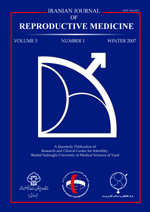
|
International Journal of Reproductive BioMedicine
Research and Clinical Center for Infertility, Shahid Sadoughi University of Medical Sciences of Yazd
ISSN: 1680-6433
EISSN: 1680-6433
Vol. 11, No. 1, 2013, pp. 11-18
|
 Bioline Code: rm13002
Bioline Code: rm13002
Full paper language: English
Document type: Research Article
Document available free of charge
|
|
|
International Journal of Reproductive BioMedicine, Vol. 11, No. 1, 2013, pp. 11-18
| en |
Melatonin effect during different maturation stages of oocyte and subsequent embryo development in mice
Bahadori, Mohammad Hadi; Ghasemian, Fatemeh; Ramezani, Mina & Asgari, Zakieh
Abstract
Background: It is important to protect oocytes and embryos from oxidative stress in the culture medium. Melatonin has been shown to be a direct free radical scavenger.
Objective: Effect of melatonin during in vitro oocyte maturation, fertilization and embryo development of mouse oocytes was evaluated.
Materials and Methods: Oocytes from supper-ovulated mouse were divided to two groups: cumulus oocyte complexes (COCs, group I) and denuded COC (d-COCs, group II). The oocytes were cultured in maturation medium with different doses of melatonin (1×101-105 nM). The cumulus expansion and nuclear status were evaluated after 24 h of in-vitro maturation. The oocytes were used for in-vitro fertilization. The fertilized oocytes were cultured in medium supplemented with different doses of melatonin.
Results: The expansion (86.79%) and maturation (80.55%) rate of COCs increased in supplemented medium with 10 nM of melatonin vs. control group (73.33%), p=0.006 and p=0.026 respectively), but oocytes without cumulus cells indicated higher maturation rate at higher melatonin doses (10 and 100 μM, 84.34% and 79.5% respectively( vs. 69.33% in control group (p=0.002). Fertilization rate was higher in treated medium with 1 μM of melatonin (93.75%, p=0.007). The rate of cleavage and blastocyst formation was promoted in medium supplemented with 10 and 100 nM of melatonin (92.37% and 89.36% vs. 81.25% in control group, p=0.002). We observed a dose dependent response to melatonin treatment in this experiment.
Conclusion: Exogenous melatonin can promote cumulus cell expansion, in vitro oocyte maturation, and embryo development. However we investigated a dose-dependent response in different stages of maturation and development. It may reflect sensitive rate of oocytes and embryos to culture conditions.
Keywords
In vitro oocyte maturation, Development, In vitro fertilization, Melatonin, Cumulus-oocyte complex.
|
| |
© Copyright 2013 - Iranian Journal of Reproductive Medicine
Alternative site location: http://www.ijrm.ir
|
|
